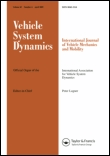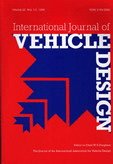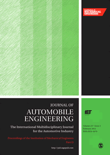
VEHICLE SYSTEM DYNAMICS
Scope & Guideline
Shaping the dynamics of automotive engineering with high-impact research.
Introduction
Aims and Scopes
- Vehicle Dynamics Analysis:
Research focusing on the dynamic behavior of various vehicles including rail, road, and off-road vehicles. This includes studies on stability, handling, and ride comfort. - Control Systems Development:
Development of advanced control strategies for vehicle systems, incorporating methodologies such as model predictive control, adaptive control, and fault-tolerant systems to enhance vehicle performance. - Simulation and Modelling Techniques:
Innovative simulation techniques, including multibody dynamics and finite element analysis, are utilized to model vehicle behavior and interactions with their environments. - Wheel-Rail Interaction Studies:
In-depth analysis of the interactions between wheels and rails, including wear mechanisms, adhesion, and the effects of track geometry on vehicle dynamics. - Advanced Suspension Systems:
Research into suspension systems, including semi-active and active suspension designs aimed at improving ride quality and stability. - Vehicle-Track Coupled Dynamics:
Studies examining the dynamic interactions between vehicles and track systems, focusing on the effects of track irregularities and vehicle design on overall system performance.
Trending and Emerging
- Autonomous Vehicle Dynamics:
A surge in research focused on the dynamics of autonomous vehicles, including trajectory tracking, sensor integration, and adaptive control systems, reflecting the industry's shift towards automation. - Machine Learning Applications:
An increasing incorporation of machine learning techniques for predictive maintenance, fault detection, and optimization of vehicle dynamics, highlighting the integration of AI in vehicle systems. - Sustainability and Energy Efficiency:
Research focused on enhancing the energy efficiency of vehicles and reducing their environmental impact is gaining traction, with studies exploring hybrid and electric vehicle dynamics. - Smart Tire Technologies:
Emerging interest in smart tire technologies that integrate sensors for real-time data collection and analysis, enhancing vehicle dynamics and safety through improved feedback mechanisms. - Digital Twin Technologies:
The adoption of digital twin technologies for real-time monitoring and simulation of vehicle dynamics is becoming increasingly relevant, allowing for more accurate predictions and optimizations.
Declining or Waning
- Traditional Mechanical Systems:
Research focused on conventional mechanical systems without integration of modern technologies or methodologies has seen reduced interest as the field evolves towards more advanced and integrated approaches. - Basic Vehicle Dynamics without Control Applications:
Studies solely aimed at fundamental vehicle dynamics without applying control strategies or modern computational approaches are becoming less frequent as the field progresses towards more complex and practical applications. - Historical Data Analysis:
The focus on historical data analysis for vehicle performance has waned, as researchers increasingly prioritize real-time data acquisition and analysis methods, leveraging advancements in sensor technology. - Static Analysis of Vehicle Performance:
Static analyses that do not consider dynamic or real-time factors are less common as the emphasis shifts to understanding dynamic interactions and their implications for vehicle design and safety.
Similar Journals

MULTIBODY SYSTEM DYNAMICS
Elevating Engineering Standards with Dynamic InsightsMULTIBODY SYSTEM DYNAMICS is a prestigious peer-reviewed journal published by SPRINGER, dedicated to the field of multibody dynamics and its applications across various engineering disciplines. Established in 1997, this journal has become a leading forum for researchers and practitioners, showcasing innovative research and advancements in areas such as Aerospace Engineering, Mechanical Engineering, and Control and Optimization. With an impressive trajectory reflected in its Q1 rankings in multiple categories for 2023, including a notable rank of #20 in Control and Optimization, MULTIBODY SYSTEM DYNAMICS plays a crucial role in shaping the future of mathematical modeling and simulations within the engineering community. The journal offers a robust platform for the dissemination of high-quality research, fostering collaboration and dialogue among scientists and engineers worldwide. Interested contributors can expect their work to reach a significant audience, further enhancing their influence in various applications. The journal does not currently provide Open Access options, ensuring that submissions undergo rigorous peer review to maintain its high academic standards.

International Journal of Dynamics and Control
Transforming Complex Systems with Cutting-edge ResearchInternational Journal of Dynamics and Control, published by SPRINGERNATURE, is a prestigious academic journal aimed at advancing the fields of Civil and Structural Engineering, Control and Optimization, Electrical, Electronic, and Mechanical Engineering, as well as Modeling and Simulation. With an ISSN of 2195-268X and an E-ISSN of 2195-2698, this journal focuses on high-quality research that addresses complex dynamic systems and control methodologies essential for innovation and progress in engineering disciplines. The journal has achieved significant recognition, being ranked in the second quartile for multiple categories in 2023, which underscores its impact and relevance within the academic community. Although it operates under subscription access, its rigorous peer-review process ensures that published articles meet the highest standards of scientific excellence. Researchers, professionals, and students alike will find valuable insights and methodologies that inform their work and inspire future studies in dynamic systems and controls.

INTERNATIONAL JOURNAL OF AUTOMOTIVE TECHNOLOGY
Exploring New Horizons in Automotive AdvancementsINTERNATIONAL JOURNAL OF AUTOMOTIVE TECHNOLOGY, published by the Korean Society of Automotive Engineers (KSAE), stands as a key platform in the field of Automotive Engineering since its inception in 2000. With an ISSN of 1229-9138 and an E-ISSN of 1976-3832, this esteemed journal aims to disseminate cutting-edge research, innovative methodologies, and advancements in automotive technology. As of 2023, it holds a distinguished Q2 quartile ranking in the Automotive Engineering category on Scopus, featuring a competitive rank of 48/125, illustrating its recognition among peers and the academic community. The journal also enjoys a global readership despite its base in South Korea. Researchers, professionals, and students in the automotive sector are encouraged to contribute to this journal, thus promoting collaboration and knowledge exchange that fosters innovation and progress in automotive engineering. Additionally, the journal is committed to enhancing accessibility of knowledge across boundaries and aims to continue serving as a catalyst for academic growth up to the year 2024.

INTERNATIONAL JOURNAL OF VEHICLE DESIGN
Exploring the Future of Automotive EngineeringThe INTERNATIONAL JOURNAL OF VEHICLE DESIGN is a distinguished publication that has been at the forefront of automotive engineering and mechanical design since its inception in 1979. Published by INDERSCIENCE ENTERPRISES LTD in the United Kingdom, this journal aims to foster innovative research and technical knowledge in the field of vehicle design, encompassing various aspects from conceptualization to manufacturing and performance analysis. With an ISSN of 0143-3369 and an E-ISSN of 1741-5314, the journal extends its accessibility to a global audience, although it currently does not operate under an open access model. Recognized for its scholarly contributions, it holds a Q3 ranking in Automotive Engineering and a Q4 ranking in Mechanical Engineering as of 2023, reflecting its position among peers with an increasing impact in the discipline. Researchers, professionals, and students will find valuable insights and cutting-edge research in the articles published, contributing to a deeper understanding of advancing vehicle technologies and methodologies. For inquiries, the journal is based at the World Trade Center Building, 29 Route de Pré-Bois, Case Postale 856, CH-1215 Geneva, Switzerland, where one can also follow its developments and contribution to the growing body of knowledge in vehicle design.

Ingineria Automobilului
Connecting Academia and Industry for Automotive ProgressIngineria Automobilului is a prominent journal dedicated to advancing knowledge in the field of automotive engineering. Published by the SOC AUTOMOTIVE ENGINEERS ROMANIA, this journal serves as a vital platform for the dissemination of high-quality research, innovative methodologies, and groundbreaking applications in automotive technology. With an ISSN of 1842-4074, it provides an essential resource for researchers, professionals, and students who are committed to the development and enhancement of automotive systems. Although the journal currently does not offer open access, its contributions are crucial for ongoing advancements in automotive design, safety, and sustainability. The publication aims to foster collaboration between academia and industry, emphasizing the importance of interdisciplinary approaches in solving complex challenges facing the automotive sector today. By facilitating discussions on emerging technologies and engineering practices, Ingineria Automobilului continues to play a pivotal role in shaping the future of automotive engineering.

PROCEEDINGS OF THE INSTITUTION OF MECHANICAL ENGINEERS PART D-JOURNAL OF AUTOMOBILE ENGINEERING
Accelerating Research in Automotive TechnologyPROCEEDINGS OF THE INSTITUTION OF MECHANICAL ENGINEERS PART D-JOURNAL OF AUTOMOBILE ENGINEERING, published by SAGE PUBLICATIONS LTD, is a premier peer-reviewed journal dedicated to advancing the field of automobile engineering. Established in 1989, this journal serves as a vital platform for researchers, professionals, and students interested in the latest advancements in automotive technology and engineering practices. With a significant focus on aerodynamics, vehicle dynamics, and safety innovations, it consistently ranks in the Q2 quartile within both Aerospace Engineering and Mechanical Engineering, showcasing its influence and reliability in the academic community. The journal is indexed in Scopus with impressive rankings, being placed in the 41st percentile for Aerospace Engineering and the 214th percentile for Mechanical Engineering, further solidifying its importance in these fields. As an important resource for cutting-edge research, the journal does not currently offer open access, making it a great venue for disseminating substantial findings that drive the future of automotive innovation.

eTransportation
Advancing Knowledge in Automotive and Energy EngineeringeTransportation is a premier academic journal published by Elsevier, dedicated to advancing the fields of Automotive Engineering, Electrical and Electronic Engineering, Energy Engineering and Power Technology, and Transportation. Since its inception in 2019, the journal has achieved an outstanding reputation, maintaining a prestigious Q1 ranking across multiple categories in the 2023 Scopus rankings, including a remarkable top position in Automotive Engineering. With an impact factor reflecting its influence and rigorous peer-review process, eTransportation serves as a vital platform for researchers, professionals, and students alike, fostering innovation and disseminating vital research findings that shape the future of transportation technologies. Based in the Netherlands, it supports open access options that enhance the visibility and accessibility of research, ensuring scholarly engagement worldwide. As the field evolves, eTransportation is poised to lead discussions and advancements towards more efficient, sustainable, and intelligent transport solutions.

International Journal of Heavy Vehicle Systems
Transforming Heavy Vehicle Systems Through ResearchThe International Journal of Heavy Vehicle Systems, published by INDERSCIENCE ENTERPRISES LTD in the United Kingdom, is a pivotal resource for professionals and researchers in the fields of automotive and mechanical engineering. With an ISSN of 1744-232X and an E-ISSN of 1741-5152, this journal serves as an academic platform dedicated to exploring the latest innovations and technologies pertaining to heavy vehicle systems, including design, performance, and environmental impact. Boasting a Category Quartile of Q3 in both Automotive and Mechanical Engineering as of 2023, it ranks among the growing body of literature in these disciplines, indicative of its commitment to quality research. The journal is widely accessible through diverse open access options, encouraging the dissemination of knowledge within the academic community. By publishing cutting-edge studies and reviews, the International Journal of Heavy Vehicle Systems plays an essential role in advancing our understanding of heavy vehicle technologies, providing invaluable insight for engineers, researchers, and students eager to contribute to this dynamic field.

International Journal of Mechanical System Dynamics
Shaping the Future of Control Systems and DynamicsInternational Journal of Mechanical System Dynamics, published by WILEY, is a premier open-access journal dedicated to advancing the field of mechanical engineering and control systems. Launched in 2021, this journal has rapidly established itself as a vital resource for researchers, professionals, and students by providing a platform for high-quality research and innovative methodologies in mechanical systems and dynamics. With an impact factor that reflects its significant contributions to the field, the journal is positioned in the Q2 quartiles of both the Control and Systems Engineering and Mechanical Engineering categories. Accessible online, it offers a transparent publication process and engages a global audience, making it a crucial venue for disseminating cutting-edge research findings. As of 2023, the journal boasts notable Scopus rankings, including 292nd in Mechanical Engineering and 148th in Control and Systems Engineering, positioning it favorably among its peers. With plans for continued growth through 2024, the International Journal of Mechanical System Dynamics stands at the forefront of mechanical innovation and interdisciplinary collaboration.

SAE International Journal of Passenger Vehicle Systems
Connecting Engineers and Researchers for Automotive ExcellenceWelcome to the SAE International Journal of Passenger Vehicle Systems, a premier publication in the realm of automotive engineering. Published by SAE International, this journal serves as a critical platform for disseminating high-caliber research focused on the innovation and advancement of passenger vehicle systems. With an impact factor that reflects its growing influence, this open-access journal enhances visibility and accessibility, supporting a diverse readership that includes researchers, engineers, and automotive professionals. Covering a broad scope that incorporates safety, reliability, and mechanical engineering among others, the journal is categorized in the Q3 and Q4 quartiles for various engineering fields, indicating its significance and the potential for impactful contributions to ongoing discussions within the automotive sector. The Scopus rankings further underscore its commitment to quality, placing it within the mid-range of prominent publications. As a valued resource, the SAE International Journal of Passenger Vehicle Systems from 2022 to 2024 offers a vital forum for knowledge exchange, aimed at inspiring breakthroughs in automotive technology and enhancing passenger safety.